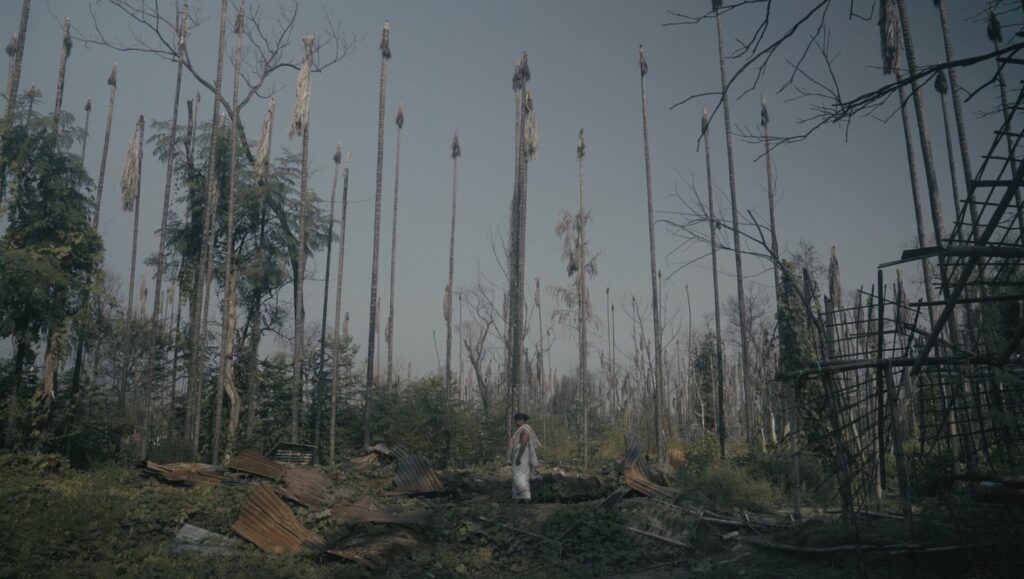Jaicheng Zxai Dohutia’s third feature film, Baghjan (2024), is based on the tragic real-life incident of Assam’s longest oil-field fire in Baghjan village and weaves a fictionalized narrative around the events. The film is marked by simplicity and realism, effectively capturing the harrowing experiences of Bhagjan’s inhabitants, who had to leave their homes and live in relief camps due to the fire.
Manab (Jadumoni Baruah) and his pregnant wife, Bhairabi, live in Baghjan, a village surrounded by rich oil and gas fields. One day, a huge explosion occurs during oil extraction, creating a catastrophe that engulfs their entire village. Bhairabi loses her life in the blast. Traumatized, Manab refuses to accept that his wife is gone and continues searching for her. His close friend, Bimal (Monuj Borkotoky), tries to be a constant support, but he has his issues to contend with. Meanwhile, the victims are sheltered in a relief camp, even as they await justice from the Government.
Baghjan’s storytelling is understated and realistic, bordering on a documentary-like approach. Events follow a natural rhythm as life unfolds in a village after a devastating disaster. Through the victims living in makeshift camps and awaiting a return to normalcy in a harsh and unrelenting environment, Dohutia captures the fragile balance between despair and psychological trauma and how these experiences shape the survivors’ ability to rebuild their lives and rediscover hope.
A defining characteristic of the film is its deliberate refusal to exaggerate. It never pretends to romanticize the reality of the people and opts to present life as it is, in all its stark truth. The natural dialogues enhance the realism, allowing the story to confront the crisis head-on without unnecessary melodrama. As the villagers endure their struggles, the film never asks us to pity them. Their distress is presented as a fact of life and their resilience is what truly defines them. Whether they are queuing for food, washing dishes or beginning their morning routines, the film captures these moments with a perceptive verisimilitude. The film focuses on a small set of characters, tracing their ordinary, unembellished lives in hardship. Dohutia also frames this tragedy against the picturesque countryside, contrasting its beauty with the calamitous consequences of corporate negligence. By doing so, he allows the narrative to highlight how history is as much about the devastating impact of unscrupulous policies as it is about the resilience and suffering of the people who endure them.
Though addressing a contemporary political issue, Baghjan refrains from directly blaming the incumbent government for the man-made disaster. Instead, the character of Bimal serves as a vehicle for instilling a sense of guilt and accountability. In one poignant scene, he confesses to Manab that, despite knowing the risks of setting up the oil company in the village, he was blinded by greed—and now everyone is suffering. Through Bimal, the film gently critiques the role of individuals and institutions in prioritising profit over human lives, delivering its political message powerfully with subtlety and restraint.
The cinematography by Nihar Ranjan Gogoi captures the suffering of the people with an intensity that frames the characters trapped in an environment with no escape. The on-location footage during the incident, shot by Dohutia himself, enhances the sense of immediacy, imbuing the narrative with a raw, immersive quality. Dohutia, who has also edited the film, seamlessly allows the scenes to unfold with the rhythm of life, letting us feel the characters’ misery. There are times, though, when their sufferings in the relief camp appear repetitive and a tad overlong. The aural space created by Debajit Gayan is well-structured with ambient sounds and the natural flow of dialogues, contrasting with the intense noise of the oil burning in the well.
The film’s principal cast includes Jadumoni Baruah, Monuj Borkotoky, and Sobita Borah, all of whom bring a naturalism to their roles that blends perfectly with the film’s tone. The remainder of the cast consists of non-professional actors from the region, many of them real-life victims of the tragedy, further enhancing the documentary-like feel of the film.
Building on its quiet authenticity, Baghjan underscores the colossal human tragedy while quietly making a powerful political statement. Through its depiction of life after disaster, the film exposes how lies, negligence, greed for power, and governmental apathy exacerbate the suffering of the citizens. Dohutia once again confirms his status as a socially relevant filmmaker by confronting audiences with a raw, unsettling view of an incident that should have shaped the political landscape of Assam with intense debate and questionable morals.
Baghjan had its Indian premier in the ‘Indian Cinema Now’ section of the recently concluded International Film Festival of Kerala (IFFK) held from the 13th to the 20th of December, 2024.
Assamese, Moran, Drama, Color



Thank you so much🙏🙏